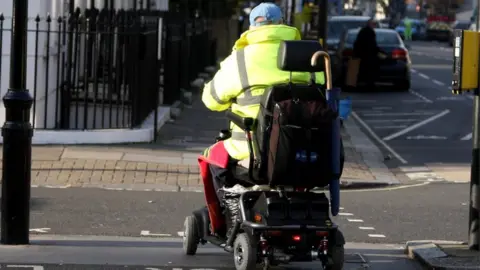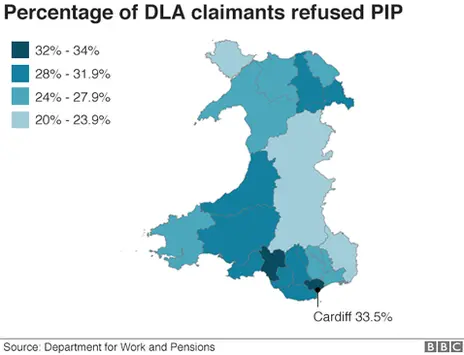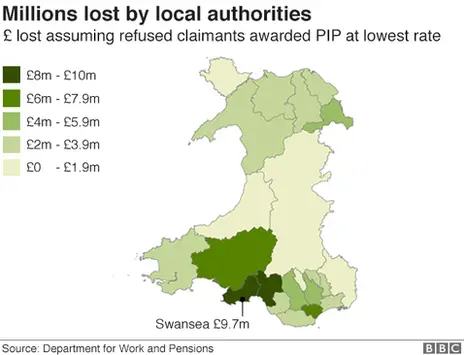£87m hole as almost a third of DLA claimants refused PIP
A father died weighing just six stone (38kg) days before he was due to appeal a decision to refuse him benefits.
The late Keith Jones was one of 30,000 former claimants of Disability Living Allowance (DLA) in Wales to be refused Personal Independence Payments (PIP).
BBC Wales News estimates that this represents a cut of at least £87m. Of those who appealed a refusal at tribunal, 75% were successful.
The UK government said 40% of claimants receive more money under PIP than DLA.
PIP has been gradually replacing DLA as the main benefit for disabled or ill people since the roll out started in 2013.
Claimants of DLA have been made to undergo reassessments which are carried out by private firm Capita on behalf of the UK government.
 Kerry Jones
Kerry JonesResearch by BBC Wales News shows that of the more than 100,000 DLA claimants reassessed for PIP in Wales, almost 30,000 - 29% - were disallowed.

 Kerry Jones
Kerry JonesKeith Jones, from Wrexham, was refused PIP and died aged 66 while waiting to hear his appeal
Mr Jones, a former electrician, was awarded DLA in 1997 after mouth cancer left him unable to eat solid food and struggling to walk more than 20 metres.
In 2016, Mr Jones was told to apply for PIP and did so with the help of his local Citizens Advice Bureau.
After an assessment at his home, Mr Jones was shocked to discover he was refused the new benefit. His application for a mandatory reconsideration also failed.
"When it came back he rang me and was so stressed. He didn't know what to do next," his daughter Kerry Jones said. "The assessment just didn't work for him. It was unfair."
Mr Jones appealed the decision and was given a tribunal date of 4 August 2017. By this time, his cancer had returned and he died two days before his appeal was due to be heard.
Ms Jones decided to continue her dad's fight and after the hearing was delayed until January this year, Mr Jones was awarded PIP.
She used her father's backdated PIP payments to cover the cost of his carers and the headstone on his grave.
"I came out of court sobbing," Ms Jones said. "They failed my dad in a big way. I am angry and disappointed."

'Deeply concerning'
Disability charity Scope said the figures are "deeply concerning" and called for an "urgent overhaul" of the assessment process.
"It's deeply concerning that so many disabled people are facing a sudden drop in vital financial support," said James Taylor from Scope.
"Life costs more if you are disabled. These extra costs haven't disappeared just because there is a different assessment process.
"Without an urgent overhaul of the PIP assessment process, the system will continue to work against disabled people, instead of for them."


What is PIP?
PIPs are for those who need help with extra costs associated with long-term illness or disability and pays between £57.30 and £139.75 per week.
To be awarded PIP, the claimant must undergo an assessment - which can include a face-to-face appointment - to decide how someone's illness or disability impacts on the cost of their day-to-day lives.
The DWP said many people on the old DLA benefit were not assessed for years, whereas PIP assesses people regularly to ensure they receive the right level of help.

BBC Wales News calculations recognised by Scope - which assumes that all those refused PIP following a reassessment would have been entitled to the lowest rate - reveal that the number of refusals amount to an annual cut of £87m.
Some of the most deprived areas in Wales have been hardest hit by the cuts.

With 13 of its neighbourhoods among the most deprived 10% in Wales, Neath Port Talbot, which saw 32% of its DLA claimants refused PIPs, will face a cut of more than £8m a year.
On the other hand, a joint-lowest 24% of DLA claimants in Monmouthshire - the least deprived county in Wales according to the Welsh Index of Multiple Deprivation - were refused PIP, amounting to a £1.5m annual cut, the lowest in Wales.

Figures from the Ministry of Justice also reveal that in the 2017/18 financial year, 75% of appeals made against decisions to refuse PIP were successful once they reached a hearing stage at tribunals in Wales.
The UK government point to a nominal rise in DLA and PIP expenditure in Wales - from £1bn in 2014 to £1.2bn in 2017.
A DWP spokesperson said: "We're committed to ensuring that disabled people get the full support that they need, and under PIP in Wales 40% of people are getting a higher rate of support than they were previously getting under DLA.
"Decisions are made following consideration of all the information provided by the claimant, including supporting evidence from their GP or medical specialist."
The DWP added that 3.3 million PIP decisions have been made - and of these 9% have been appealed and 4% overturned.
"In the majority of successful appeals, decisions are overturned because people have submitted more oral or written evidence," added the spokesperson.
